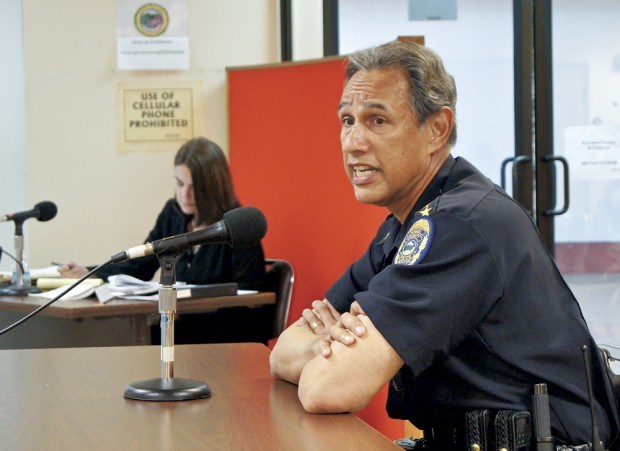LIHU‘E — The controversy over whether the mayor has authority to intervene with any department heads appointed by county commissions was the focus of a public hearing by the Kaua‘i County Charter Review Commission on Monday. Most of the testimony
LIHU‘E — The controversy over whether the mayor has authority to intervene with any department heads appointed by county commissions was the focus of a public hearing by the Kaua‘i County Charter Review Commission on Monday.
Most of the testimony centered on the mayor’s decision in February to suspend the county police chief, then place him on leave and then ignore a decision by the county Police Commission to reinstate the police chief. The question was whether the charter gave the mayor that right.
The charter review commission heard testimony on Monday from community members and public officials, but took no action at the end of the day.
Mayor Bernard Carvalho Jr. did not attend the meeting.
Police Commissioner Charles Iona testified, but said he was commenting as an individual commissioner and not on behalf of the group. He said the suspension of the police chief did not effectively remove his powers, but that the administration felt otherwise. He said outside counsel would provide the language to prevent this from happening again.
“Except as otherwise provided” is stated with the mayor’s “powers, duties and functions,” according to the charter, Iona said. Without that, the mayor has the right to exercise direct supervision, he said.
“This tells me that unless there is something else that is addressed then the rest of the section continues,” he said. “But there is some other provision that is being addressed, and therefore the powers, duties and functions of the mayor has to recognize these provisions.”
Police Chief Darryl Perry’s contract states he must report to the commission regarding administrative matters and for legislation and policies to make recommendations, Iona said. It states he shall communicate with the mayor and county council on budget items and matters involving safety or health.
“When you implement someone other than the mayor to have powers, there have been situations when other departments have given direct supervision to a department, which preempted the police department from functioning as it should, and that came from the county attorney’s office,” Iona said.
First Deputy Prosecuting Attorney Jake Deleplane said the language is clear, and that the mayor overstepped his authority in removing the police chief. With his gun and badge taken, he was effectively removed, Deleplane told the Charter Review Commission.
The commissions exist to place citizens in positions of authority over department heads based on technical competence, said Deleplane. It frees department heads from coercive political influence, and that to allow a mayor to remove a police chief at any time is essentially making the mayor the police chief.
Deleplane said that in his personal opinion the charter language is clear but has a muddled interpretation from the county attorney’s office.
County Prosecuting Attorney Shaylene Iseri-Carvalho said the matter has disrupted police operations and also the work of the prosecutor’s office. The charter was designed to protect against the type of intrusion that occurred with the police.
“There are ramifications for all of the counties,” Iseri-Carvalho said.
There is room for clearer language at times, but the charter is not the problem, she said.
Iseri-Carvalho said another concern is that the police chief was denied due process in his suspension.
Perry testified the department has a system in place to deal with complaints and investigations. To be called in and suspended without a hearing or investigation showed a lack of due process with respect to disciplinary actions, he said.
Perry said his goal is to ensure the department will be able to operate without interference. He said he would serve until this matter is resolved.
He said that in his 30 years of law enforcement experience, at no time did a mayor interfere with police operations. He supports a declaratory ruling on the charter to require himself and all parties to testify in 5th Circuit Court.
Charter Review Commission member Jan Tenbruggencate said he asked his fellow commissioners to review
the charter.
Rob Abrew, a member of the community, testified he believes the mayor’s actions were dictatorial when the mayor first suspended Perry and then placed him on leave in February.
The Kaua‘i County Police Commission later reinstated Perry, but the police chief was not given access to his equipment or office until the mayor held a news conference in March to say Perry was no longer on leave.
“The mayor also came to this committee (Charter Review Committee) and asked for this power,” Abrew said. “He asked for a charter amendment to be the authority over every department. So if he asked this committee, then why now does he have this power?”
Community member Elli Ward testified that the matter began with an internal complaint filed by a police officer.
“It is my humble opinion that the mayor took the necessary decisive action to protect the victim in the interest of the county,” she said.


